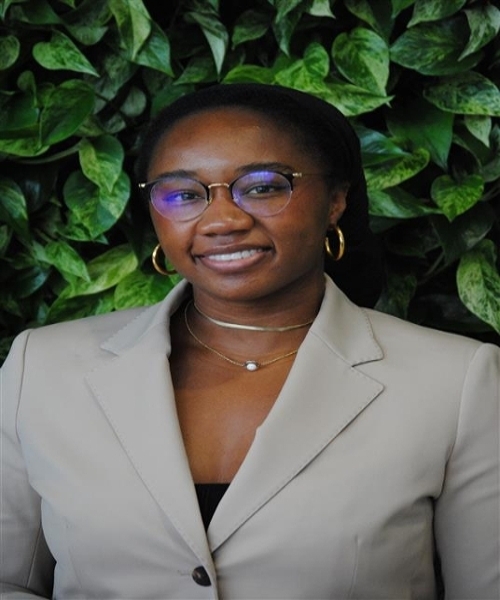LGS Student Spotlight | Kristen Patterson
By Kia Lisby

Fourth-year chemistry PhD candidate Kristen Patterson has always had an interest in the environment, sustainability, and environmental racism.
Growing up in Florida and Jamaica, Patterson was constantly exposed to environmental disasters. She and her family would find small ways to help during disaster strikes. Wanting to continue making an impact, Patterson chose chemistry to pursue her education.
“I wanted to continue helping, and it naturally led me to do a [related] science project, working on oil spill cleanups and taking summer opportunities to do research. My interest grew from there.”
Patterson received her undergraduate Bachelor of Arts degrees in chemistry and sociology from the New College of Florida in Sarasota, Florida. When she applied to Emory, she also applied to various graduate schools in Florida and a few out of state. Unsure of where she wanted to go, a former advisor suggested Patterson look into Emory.
After researching Emory’s chemistry program and seeing the pros of the department, Patterson applied. Emory was the first school she heard back from offering her an acceptance letter.
“Once I received the letter, I was invited to the admitted students’ event, and it felt like they [Emory] spared no expense. I felt like I got a good read for not just the research but also the culture of the department, which I liked.”
When Patterson first came to Emory, she joined a chemical biology lab where she attached DNA strands called aptamers to polymer membranes to target small molecules like pollutants and marine natural products while simultaneously cleaning water. In this work, she identified interference between the coupling agent she was using to attach the aptamers and fluorescent molecules she was using to verify attachment, resulting in her first paper published at Emory.
Four years into the program, Patterson is focused on using biopolymers to increase the bioavailability of drug and prodrug candidates. Throughout her PhD, Patterson has worked with polymers and began her program working with polymers for water treatment.
Patterson’s current research features the creation of a nanoformulation of an investigational medicine, Q-122, for treating hot flashes in postmenopausal women. Q-122 was discovered at Emory University and later licensed to QUE Oncology, which has recently completed a Phase II clinical trial on Q-122.
In addition to her studies, Patterson is also an EDGE (Emory’s Diversifying Graduate Education) Fellow under the leadership of Dr. Amanda Marie James. Part of Patterson’s role as a fellow includes recruiting prospective students from historically underrepresented backgrounds for Laney Graduate School (LGS).
As a BIPOC (Black, Indigenous Person of Color), Patterson says it can sometimes be challenging in her field because the diversity numbers aren’t as high as hoped for.
“That’s why we do recruitment focusing on underrepresented students and ensuring they have access to all the resources they can to make the most informed and best decision for themselves.”
With her graduation date approaching in May 2025, Patterson believes being open and vulnerable with the next generation of prospective Emory PhD students has been most effective as they make their graduate school decisions.
“I try to lead earnestly because I want to share what I wish I had known when considering schools, writing my applications, and arriving here. There are things I think would have made things easier—and this knowledge has to go somewhere.”
In addition to being an EDGE Fellow, Patterson has also found community in the black chemist network, National Organizations for the Professional Advancement of Black Chemists and Chemical Engineers (NOBCChE), and in her current lab.
“I work with the Liotta lab. They took me in between my second and third years, and it’s been nothing but support from the get-go, which has been wonderful. Working with this group has given me an understanding of what it would be like to work with a pharmaceutical startup as opposed to only working in graduate research-oriented labs. I like learning something new every day, even when it’s challenging.”
Following graduation, Patterson hopes to work with the U.S. Environmental Protection Agency (EPA) or a comparable non-governmental organization (NGO). Still, in the meantime, she’s keeping an open mind on where chemistry may lead her.